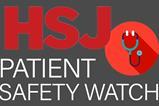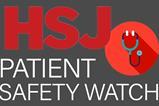HSJ hosts the Patient Safety Watch newsletter, written by Patient Safety Watch chief executive James Titcombe
Good afternoon and welcome to this fortnight’s edition of the Patient Safety Watch newsletter.
Mental health services not learning from deaths, warns report
A Health Services Safety Investigations Body report, published this fortnight, examined deaths in inpatient mental health units as well as deaths which happened 30 days after discharge. It found barriers to carrying out effective investigations into deaths, inconsistencies in data and data reporting, and problems ensuring system-wide learning.
The researchers also warned of a blame culture and a failure to take into account the emotional distress endured by all when investigating a death, with some bereaved families describing this process as worse than the death itself.
Nichola Crust, HSSIB senior safety investigator, said: “Whilst the report does paint a sobering picture, it also does pinpoint the opportunities for improvement, through our findings and safety recommendations. We emphasise areas that should be prioritised to remove the barriers and limitations to learning – only then will the system see an improvement in patient safety, a reduction in compounded harm and ultimately a reduction in deaths in inpatient care.”
Although this report focuses on mental health services, many of the issues identified apply to the wider healthcare system too, such as a lack of a national system to ensure investigation recommendations are implemented, families feeling marginalised and excluded from investigation processes and legal processes within organisations which unintentionally shut down learning opportunities and contribute to a culture of defensiveness rather than reflection.
The report also highlights the need to do more to support people affected by healthcare harm, including providing more compassionate support through investigation processes and the use of restorative practice to better enable healing and recovery. It was great to see the Harmed Patient Pathway project referenced, which aims to support healthcare organisations in these key areas.
Previous newsletters have highlighted that learning from deaths in the NHS is an ongoing area of focus for the new All Party Parliamentary Group (APPG) on Patient Safety, and this latest report from HSSIB underpins that, despite recent focus on this area, there remains much to do. More details on future APPG work in this area to come.
Poll: Nearly a fifth of people have witnessed or received corridor care in last six months
A You Gov poll, commissioned by the Royal College of Nursing, has found that nearly one in five (19 per cent) of people in England have either received care or seen care being administered in a non-clinical setting, such as a corridor or a car park, at some point in the last six months.
RCN general secretary and chief executive Nicola Ranger said: “The public and nursing staff can see a tragedy for patients unfolding before their eyes. They know care standards are unacceptable and they want government to act decisively.”
The poll follows an RCN report last month which detailed nurses’ harrowing experiences of corridor care, including accounts of patients dying on corridors and not being discovered for some time.
Watchdog probes service after more than a dozen people raise concerns over unneeded chemotherapy
HSJ has reported that the Care Quality Commission is examining University Hospitals Coventry and Warwickshire after 14 people raised concerns that they may have received temozolomide – a cancer treatment – for much longer than deemed safe, which has led to “debilitating side effects”.
It follows reports from BBC News that one of the trust’s patients had received the treatment for a brain tumour for more than 14 years, despite NHS guidelines recommending treatment for six to 12 months.
Fiona Tinsley, partner and head of medical negligence at Brabners – the law firm representing several of the patients – said: “It’s rare you see anything of this scale. We believe there are many more patients out there who might not know this ongoing treatment was not in line with national and international guidance.”
UHCW chief executive Andy Hardy said: “The trust is committed to providing the best and safest care possible for our patients. We take very seriously any allegation that care provided by a member of staff, past or present, may have fallen below the standards we would expect for our patients.”
Patients let down by NHS complaints system, finds research
Research published by Healthwatch this fortnight has found more than half (56 per cent) of people who said they had had a poor NHS experience hadn’t acted on it due to concerns such as their complaint wouldn’t be used to improve services, wouldn’t be responded to effectively or wouldn’t be taken seriously.
Of those who had made a complaint, more than half (56 per cent) were unhappy with the outcome and the same proportion were unhappy with the complaints process itself.
Healthwatch chief executive Louise Ansari said: “We know that public satisfaction with the NHS is at record low levels, with too many patients receiving poor care. When patients feel their complaints are not taken seriously or don’t take any action due to a complex system, services miss out on vital information to help them improve.”
Ten-year battle over baby son’s death
An inquest opened this Monday into the tragic death of baby Ben Condon at University Hospitals Bristol and Weston Foundation Trust in April 2015.
As reported by the BBC, a previous inquest recorded Ben’s death as being caused by acute respiratory distress syndrome, human metapneumovirus and prematurity, but the High Court quashed this when new evidence emerged.
In 2017, the hospital admitted Ben had a bacterial infection and that delay in administering antibiotics contributed to his death. The Parliamentary and Health Service Ombudsman published a highly critical report into the case in 2021.
Ben’s father, Allyn Condon, read a statement to the inquest on Tuesday: “Losing a child is a tragedy in any circumstances…But in this case, that tragedy has been compounded by the fact that we have at all stages been faced with a failure to be transparent and straightforward about the circumstances that led up to Ben’s death.”
When I read about battles like those the Condon family has faced, the word that comes to mind is shameful. The NHS at its best saves lives and does overwhelming good, but experiences like this are too common and betray the very values the NHS stands for. They must become a thing of the past.
Nottingham maternity investigation extended and police investigate temporarily lost records
As reported by the BBC, Nottinghamshire Police is investigating the temporary loss of a computer file at Nottingham University Hospitals Trust.
At a public meeting last week, families were told the data – which reportedly contained maternity documents, including details of some baby deaths – had been temporarily lost but since recovered.
Meanwhile, 300 additional cases are expected to be added to the ongoing Ockenden inquiry into the trust’s maternity services after a coroner noted a discrepancy. The Ockenden inquiry has now confirmed the inquiry completion date has been extended to June 2026 to allow the additional cases to be properly reviewed.
NHSE left Health and Social Care Committee chair underwhelmed
NHS England chief Amanda Pritchard and other senior figures from NHSE were asked how prepared the organisation is to implement the government’s big healthcare shifts at a Commons health and social care committee hearing last week.
The hearing followed a critical report from the Public Accounts Committee which said “there seems a lack of readiness amongst senior health officials to take the radical steps needed” to implement the government’s forthcoming 10-Year Plan.
After the hearing, HSCC chair Layla Moran posted on X: “Following today’s report by the [PAC], this morning’s evidence session was an opportunity for NHS leadership to prove their drive and dynamism. Regrettably, we were left disappointed and frustrated.”
Ouch.
Sharing some good stuff…
Patient safety in Japan: a brief history
HSSIB has published a great guest blog by Shin Ushiro, executive board member – Japan Council for Quality Health Care and deputy director and professor of patient safety at Kyushu University Hospital. It’s an insightful read covering Japan’s patient safety journey and the similarities with other countries and future perspectives. Well worth a read!
Regulating reliably: building high-reliability regulators in healthcare
Given current scrutiny and concerns around the CQC’s performance, this timely paper from Carl Macrae explores the development of principles for high-reliability regulators in healthcare. As with all of Professor Macrae’s work, it is really interesting and relevant work that deserves to be widely read.
Preventable Deaths Tracker relaunched
Our last newsletter featured the brilliant work of Georgia Richards, who has developed the Preventable Deaths Tracker, an evidence-based vigilance tool to learn from reports by coroners. This week, the tracker has been relaunched with several changes to improve how information is collected, stored, and used. You can read more about the relaunch here, and try the new interactive database here.
How implementing PSIRF strengthened culture at Spire Healthcare
A final share for this edition – this is an informative blog about the experience of implementing the new Patient Safety Incident Response Framework at Spire Healthcare. I had an opportunity to visit staff at Spire Healthcare last month and was really impressed with the focus on patient safety, learning and culture. This blog gives a good overview of work being done to integrate PSIRF with quality improvement systems as well as an organisational approach to culture change and speaking up.
That’s nearly all for this edition. Before signing off, a quick personal thanks to staff at Blackpool Victoria Hospital who have been caring for my father, who had heart bypass surgery earlier this week. His care has been outstanding. An incredibly anxious time, but thanks to the NHS, we are hopeful for his continued recovery.
And finally….
A tribute to Professor James Reason CBE
This week we sadly mourn the loss of a huge figure in the world of patient safety, James Reason. Professor Reason’s groundbreaking work on human error and system safety transformed patient safety worldwide.
His legacy will continue to inspire efforts to build safer systems for generations to come. I wasn’t ever lucky enough to meet him, but will leave you with this fitting tribute from Steven Shorrock, who was.
Thanks for reading and please look out for our next newsletter from Jeremy in two weeks.
James Titcombe

Topics
- Amanda Pritchard
- Cancer
- East Midlands
- Emergency care
- Health Services Safety Investigations Body (HSSIB)
- HealthWatch
- Maternity
- Mental health
- NHS England (Commissioning Board)
- NOTTINGHAM UNIVERSITY HOSPITALS NHS TRUST
- Nursing
- Patient safety
- Royal College of Nursing (RCN)
- South West
- University Hospitals Bristol and Weston NHS Foundation Trust
- UNIVERSITY HOSPITALS COVENTRY AND WARWICKSHIRE NHS TRUST
- West Midlands






























1 Readers' comment